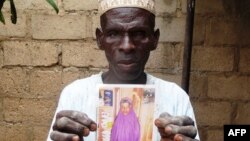A child forced to marry at just 13 who then poisoned her 35-year-old husband and three friends is set to be freed in Nigeria, lawyers and a judge said Wednesday, amid fears for her safety and future.
Human rights lawyer Hussaina Aliyu Ibrahim said she convinced the prosecutor to drop the case and on Tuesday a High Court judge in Gezawa ordered Wasila Tasi'u to be released from juvenile detention.
She can count herself lucky. Another 13-year-old who killed her 35-year-old husband remains on death row despite a ruling, exactly one year ago from the West African Community Court of Justice, that her sentence is illegal because she was a minor.
Forced marriage and child marriage are also against the law here, but widely practiced.
Second wives
Both girls had become second wives in the Muslim northern part of Nigeria where polygamy and child marriage is common. Neither had ever been to school and couldn't read or write.
Prosecutors had tried to convict Tasi'u on the strength of a confession to police written in English – she speaks only Hausa – and signed with her thumbprint.
Human rights activists who crowded the court on Tuesday cheered loudly when the judge announced the state was dropping the case against Tasi'u, who is now 14. But there were also growls of disapproval from those who believe she got away with murder.
"Four people died. People are angry. They might react," said her lawyer Ibrahim, who also feels threatened. She has championed girls' rights for 27 years and defended Tasi'u pro bono.
Some fear the case may set a precedent for the parts of the country where polygamy and forced child marriage are common.
Traditional Muslim leaders from the rural area where Tasi'u was married are demanding 36 million naira ($170,000) in blood money for each victim, under Islamic law, Ibrahim said. They refused a counter-offer from the government of 2 million naira ($9,430) for each.
Blames government
Ibrahim blames the government for the situation, noting that with no schools in the area, parents are left with no choice but to marry their daughters off young.
The girl's deeply conservative Muslim family wants her back, but the Ibrahim fears that would just consign Tasi'u to another forced marriage. She said the parents barely visited the girl during her detention following the April 5, 2014 killings.
Now, she said, conservative lawyers are trying to counsel Tasi'u's family to sue for the girl's return. Girls in rural northern Nigeria are almost exclusively valued for their labor and bride prices that can include cattle, goats, even land.
The lawyer said her Kano chapter of the International Federation of Women's Lawyers has found a family willing to care for Tasi'u until it is safe for her to return home.
"If we give her back to them, we are destroying what we did," Ibrahim said. "They should be arrested for what they did to her."













